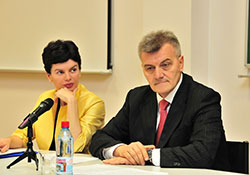Montenegro

United Nations Montenegro
On 7 April 2012, the Ministry of Health of Montenegro and the WHO Country Office organized a roundtable on this year’s theme: “Ageing and health: Good health adds life to years". Participants of the roundtable discussed various aspects of good health and healthy lifestyles over the life course.
The Head of the Country Office in Montenegro, Mina Brajović, stated that increased life expectancy in Europe is a result of overall social and economic development. “We need to match adding years to life with improved quality of life. In an environment of demographic change and rising fiscal constraints, healthy and active ageing has become key to the future sustainability of health and social care systems,” said Brajović.
She underlined that ageing concerns everyone, whether male or female, rich or poor and regardless of where they live; we should therefore all plan accordingly: “From the early years of life one has to prepare for a pleasant older age – meaning increasing the chances of remaining healthy, independent and productive,” Brajović stated. She pointed out that the prospects of remaining healthy and active in older age vary greatly between countries, depending on the level of investments in a broad range of policies that promote healthy and active ageing.
To address the challenges and opportunities of ageing populations, WHO has identified three strategic areas of action:
- promoting healthy ageing over the life course;
- developing policies for age-friendly communities/environments;
- adapting health systems to the changing needs of an ageing population.
The Minister of Health, Miodrag Radunović, stressed the importance of older people’s role in a changing society. "Older people should not be marginalized as they are a precious resource for society. Only a society that takes care of the elderly is ready for change," said Radunović.
Population ageing in Montenegro
Participants of the roundtable presented global trends, which show that the world’s population is growing older. National figures for Montenegro also demonstrated that this country is no exception. “Montenegro, one of the youngest UN members, belongs to the countries with a very old population. 17 percent of our population is aged 60 or older," Brajović said.
The Minister warned that the number of people over 80 years of age is projected to be four times higher by 2050. “Every fourth person will be older than 65 by 2050,” he added, stressing that protecting the health of older people will require a multi-sectoral approach, in addition to increased efforts by individuals of all ages to take care of their own health.
The roundtable included a set of presentations on various related topics, including:
- the role and importance of primary health care in delivering quality and equitable health services to older people;
- immunization;
- burden of noncommunicable diseases;
- social services for older people;
- experience from the “Geronto housewife” project;
- palliative care.



